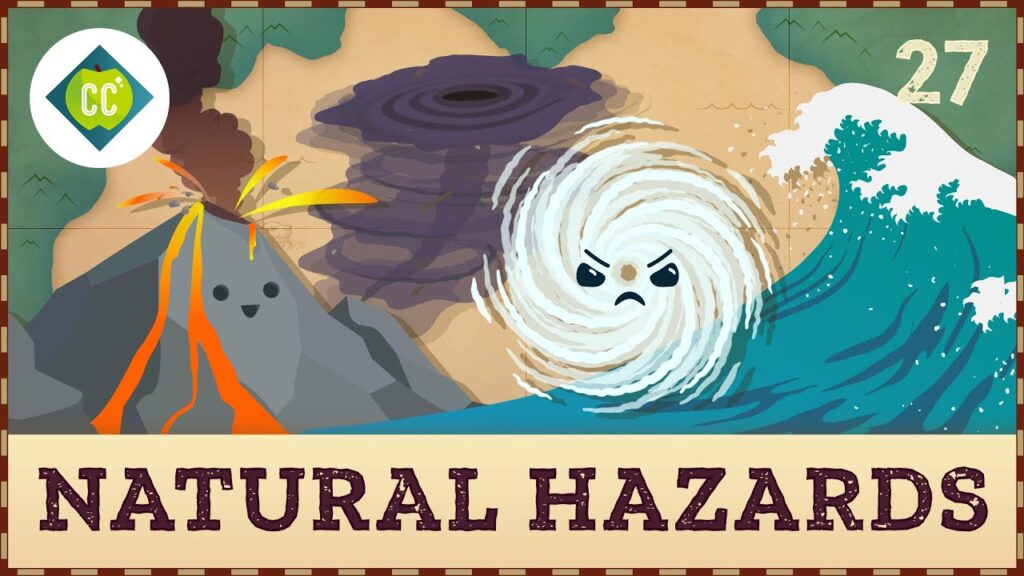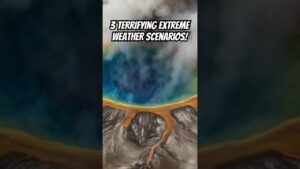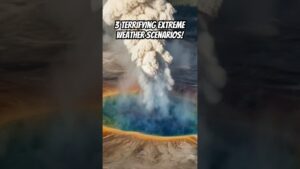
Today we wrap up the first half of our series on physical geography by taking a closer look at natural hazards – which are physical processes like heat waves and cyclones, earthquakes and volcanic eruptions, and floods and droughts. And when these natural events cause significant harm to humans, we call them natural disasters. So today we’ll explore the ways geographers analyze and track these events, and take a closer look at the human impact of Hurricane Katrina in New Orleans and The Boxing Day Tsunami on the Andaman and Nicobar islands.
Watch our videos and review your learning with the Crash Course App!
Download here for Apple Devices: https://apple.co/3d4eyZo
Download here for Android Devices: https://bit.ly/2SrDulJ
Crash Course is on Patreon! You can support us directly by signing up at http://www.patreon.com/crashcourse
Thanks to the following patrons for their generous monthly contributions that help keep Crash Course free for everyone forever:
Shannon McCone, Amelia Ryczek, Ken Davidian, Brian Zachariah, Stephen Akuffo, Toni Miles, Oscar Pinto-Reyes, Erin Nicole, Steve Segreto, Michael M. Varughese, Kyle & Katherine Callahan, Laurel A Stevens, Vincent, Michael Wang, Jaime Willis, Krystle Young, Michael Dowling, Alexis B, Rene Duedam, Burt Humburg, Aziz, DAVID MORTON HUDSON, Perry Joyce, Scott Harrison, Mark & Susan Billian, Junrong Eric Zhu, Alan Bridgeman, Rachel Creager, Jennifer Smith, Matt Curls, Tim Kwist, Jonathan Zbikowski, Jennifer Killen, Sarah & Nathan Catchings, Brandon Westmoreland, team dorsey, Trevin Beattie, Divonne Holmes à Court, Eric Koslow, Jennifer Dineen, Indika Siriwardena, Khaled El Shalakany, Jason Rostoker, Shawn Arnold, Siobhán, Ken Penttinen, Nathan Taylor, William McGraw, Andrei Krishkevich, ThatAmericanClare, Rizwan Kassim, Sam Ferguson, Alex Hackman, Eric Prestemon, Jirat, Katie Dean, TheDaemonCatJr, Wai Jack Sin, Ian Dundore, Matthew, Justin, Jessica Wode, Mark, Caleb Weeks
__
Want to find Crash Course elsewhere on the internet?
Facebook – http://www.facebook.com/YouTubeCrashCourse
Twitter – http://www.twitter.com/TheCrashCourse
Tumblr – http://thecrashcourse.tumblr.com
Support Crash Course on Patreon: http://patreon.com/crashcourse
CC Kids: http://www.youtube.com/crashcoursekids
#CrashCourse #Geography #NaturalHazards
source




SIBERIA, I def want to live an off grid, sustainable life in Siberia
We
Want
Accountancy
Course
🙏
I just realised how sad I’m going to be when this series is over 😭😭
Where would I live?
Somewhere well above sea level, so my childrens children can watch the rising sea levels flood the coastal areas, producting sea pollution nobody wants to be reaponsible for today.
This is why the British Isles are a sound place to be. We basically never get anything beyond some flooding every now and then and a Gale that you would rather be inside for.
Do not even have dangerous animals. Just gotta watch out for Smackheads and Roadmen and you're safe.
If you want a place free of almost all forms of natural disasters, plenty of access to fresh water, fertile soil and weather that rarely becomes extreme come to Zambia. Not only are we landlocked and far from costal regions, we are right in the middle of safe zone so no earthquakes or volcanoes. We are also the source of the Zambezi which is where the name Zambia comes from.
Note: It's pronounced Zamb-e-zi with 'e' as in egg. I see a lot of nature doccies pronounce it wrong and it irks me lol
AP Geo here we go!!!!!!!
My lord ….I have my geography test tomorrow and I was stressing about this topic and then you posted this ☺️
A complex web of interactions among peoples, environments, and technologies, characterized by multiple causes and consequences?
I prefer the term omni-shambles, rolls off the tongue a little better
Southern Africa experiences very few natural disasters.
Lake district in Uk
Can you make a music theory course please!! I love these videos and I need more
I think a lot of us in the Philippines have grown tired of the word resilience as it's used to wave away responsibilities and accountability in disaster risk reduction.
I live in Baden Württemberg, the south-westernmost state of germany high up over the lower river valleys. The worst disaster here I am aware of during my lifetime was a storm that blew some tiles from some houses.
🐄=🥩
Denmark, baby!
The only place in the US that I would like to live in is the Pacific Northwest. Basically, Seattle. Everywhere else gets either way too hot in summer, way too cold in winter, or just has way too few people to be enjoyable.
The place I'm actually wanting to live in is London, tbh.
Digital Hazard can be lead by a very angry Guilmon.
👍👍👍💪💪💪
This episode launches on day we got a rare earthquake in Melbourne.
Chilean here. A saying: "It isn't the earthquake what kills you, it's the building falling on you." An aspect not touched here regarding disaster prevention was politics/government/regulations. In Chile we are considerably less worried about earthquakes' effects because there is an strict set of regulations about building. Take that into account when voting for your next authorities. In Chile, building regulations are not even an arguable subject, but maybe where you live there can be a choosing between candidates who propose costly disaster preventive regulations and others who prefer to save that money for other investments with a more immediate benefit.
Choose wisely.
The rules of the tsunami:
If you are at the beach, and an earthquake strikes, strong enough that you can't stand or walk normally, get away from the sea as fast as you can, toward the hills or the tallest building. Don't wait for orders or official calls.
If the quake was minor, but the waters noticeably and rapidly retire from the beach, same, and faster if possible.
Same, if the waters just retire and it's not the time for the low tide. Even more so if there are news of an earthquake in a neighboring place.
Don't stop to get your things. A tsunami can arrive in 15 minutes or even less. Some water and a blanket is all what you'll immediately need.
When in a safe place, stay there for about 8 to 24 hours. After that, whatever could happen will have happened. Before that, it might be still risky to go back.
Experience: In Chilean 2010 major earthquake and tsunami, most people in the affected coast, trusting our national instinct and lore, run to the hills. The government, at the moment badly informed about the quake's magnitude, told people there was no risk of tsunami, so they could go back to their houses. Many did. The tsunami got them.
So, with all due respect toward all elected or not elected authorities, don't go back at least for a few hours.
That was a bit of very hardly earned experience for you.
As a Natural Hazard Mitigation Officer, I really appreciate this easy way to explain what I do!
Love the dinosaur shirt!
Who’s here just before an exam
Thank you very much for this.
Why is it a hazard if its natural but not a hazard if its us, humans?
Excellent. Very informative presentation. Thank you
.
I lived in Indonesia in 2003
who cares
This episode is poetic.
D
I dream of Iceland…🌋❄️
this video is very educational
thanks for helping me with my exam
Smash like
this chanel is pure gold